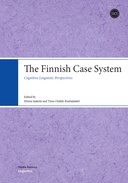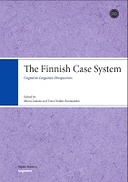Explore

The Finnish Case System
0 Ungluers have
Faved this Work
Login to Fave
This volume presents an up-to-date cognitive-linguistic account of the Finnish cases that would serve the interests of an international audience. As the Finnish linguistic tradition has always considered grammatical cases to be meaningful elements, this volume also addresses the extensive work by earlier scholars from different theoretical backgrounds. The volume consists of an introduction and eleven articles. The introduction presents the system of Finnish cases and provides a brief overview of the main tenets of cognitive linguistics, offering guidance for those readers who are not familiar with cognitive linguistics. Some articles focus on one case and present a unified account of its functions, others analyse a larger group of cases that form a system (the local cases), whereas yet others address the use of cases in certain constructions (such as expressions of change). This collection of articles also discusses more general topics, such as the notion of case, questions of polysemy, the traditional division of cases into grammatical and semantic, the relationship between inflection and derivation, and the role of inflection in the categories of adpositions and adverbs.
This book is included in DOAB.
Why read this book? Have your say.
You must be logged in to comment.
Rights Information
Are you the author or publisher of this work? If so, you can claim it as yours by registering as an Unglue.it rights holder.Downloads
This work has been downloaded 96 times via unglue.it ebook links.
- 46 - pdf (CC BY-NC-ND) at Unglue.it.
- 43 - epub (CC BY-NC-ND) at Unglue.it.
Keywords
- cases (linguistics)
- Cognitive grammar
- Cognitive linguistics
- Finnish language
- Language
- Linguistics
- Semantics
- Syntax
Links
DOI: 10.21435/sflin.23web: http://oa.finlit.fi/site/books/e/10.21435/sflin.23/
Editions




